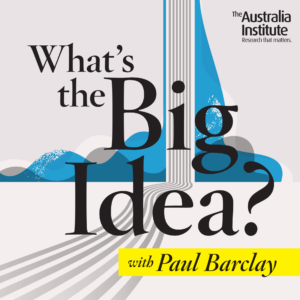Green Wall Street Will Crash
The mania around markets and investment in nature has continued at the UN biodiversity conference (#COP15) with Australia promoting the outsourcing of conservation to the private sector and its proposed ‘nature repair market’. This builds on the government’s previous promotion of ‘Green Wall Street’ – a vision that describes the world investing in Australia’s ecosystems.
On a number of occasions Minister Plibersek has justified the need for private sector involvement in environmental protection and restoration of Australia’s collapsing ecosystems on the basis that the government cannot ‘afford’ to do the job – estimated to cost around $1 billion year – alone. This is all while billions of dollars go to fossil fuel subsidies every year and the government is about to forego around $240 billion in revenue with the Stage 3 tax cuts.
The Australian Government arbitrarily allocates over two per cent of Australia’s GDP to defence spending as a ‘policy target’ (receiving record funding of $48.6 billion this year). To be clear, these are all arbitrary spending choices driven by political preference, not need, despite the rhetoric of politicians suggesting otherwise. As former Australian Treasurer, Josh Frydenberg, noted “Everything is affordable if it’s a priority”.
While the government refuses to stop subsidising and approving fossil fuel projects or end native forest logging it is unsurprising it is throwing its efforts towards increasing private involvement in conservation. It allows a minister to wipe away tears when lamenting the state of the environment without the inconvenience of subsequent outlays or dramatic changes in policy.
Proponents and government have seized upon the privatisation of nature, valuing global nature markets and ‘nature based solutions’ at hundreds of billions or even trillions of dollars – claims that are largely meaningless and impossible to prove or disprove, but that no doubt dazzle and entice prospective investors. The usual suspects, banks and big consultancies – along with a new crop of specialist climate change investment firms, carbon and nature project developers, and other intermediaries – are all spruiking the lucrative opportunities in nature. It is, it seems, possible to get rich and save the environment at the same time though there is rarely any indication of exactly how.
The government has been unable to say what the return on investment to the private sector will be, where demand for nature credits or certificates will come from, or how it can guarantee that something as inherently complex, interconnected and uncertain as biodiversity can be a low risk, scalable investment proposition. The voluntary carbon market in Australia is very small. The private sector is compelled to buy carbon credits because regulation requires they offset their emissions. Very few businesses are buying carbon credits voluntarily and where they are they are buying predominantly cheap international credits.
Which leads to the transaction costs for biodiversity credits. Measurement, evaluation and monitoring ‘nature’ has very high transaction costs, making investment similarly costly. The only way around this is when standards required for evaluation, monitoring and enforcement are relaxed, leading to biodiversity credits that are affordable but of low integrity.
Markets require certain principles to be successful:
- That there are many buyers and many sellers (power is evenly distributed)
- That the product is ‘homogenous’
- That all parties to a transaction have access to good information
- Parties are rational agents acting in their own self interest
- There are no externalities
- Products are excludable (ie not a common good such as ‘the environment)
There is no evidence that the market will successfully protect and restore our ecosystems more efficiently than government regulation, government grants or direct public provision.
For a market to operate efficiently, ALL of the conditions listed above need to be present, not just some. In the case of the proposed ‘nature repair’ market it is not clear that any of these conditions are met. The product is a common good, inherently diverse, power is concentrated, information is hard to access and highly technical. When these conditions are present the likelihood of fraud and cutting corners is high.
There is however significant evidence that the market will result in the same kinds of perverse outcomes we have seen in the private provision of other ecosystem or public services. There are few public services or common goods (the things that we all have a right to access) in Australia that haven’t been privatised in some way – childcare, education, electricity, transport, telecommunications, major infrastructure – all with the promise of better and more efficient delivery and big savings for government and consumers. However, the beneficiaries are often the shareholders, not the public. The results have ranged from higher prices for lower quality services at the relatively benign end of the spectrum to fraud, corruption and even death at the other.
The royal commission into aged care was on top of the 18 major inquiries and reviews that have already occurred over a number of years.
Yet we accept these ongoing models of treatment of our family members and loved ones despite numerous reports showing the damage they repeatedly do. How many times are we willing to attempt the same experiment for the Great Barrier Reef or the 1000 remaining numbats living in the wild before they are gone entirely?
Rather than promoting a failed vision of green capitalism at Montreal there are effective policy options at the government’s disposal that would boost Australia’s tenuous credibility and demonstrate the environment actually is back front and centre for Australia. While not as glamorous as Green Wall Street, they won’t crash and – despite what industry proponents say – have not failed. In truth they’ve never been fully exercised. Enforcing existing laws, an end to destructive subsidies and policy alignment with the states and territories would go an enormous way to protecting our ecosystems. And that’s before having to spend anything. Grants, education programs and direct incentives can be delivered to landholders and communities to restore and repair their properties without lining the pockets of financial brokers.
Good environmental policy exists and can be achieved. It’s not easy but it is simpler and far more effective (and cheaper for the taxpayer) when implemented with integrity and bravery.
Between the Lines Newsletter
The biggest stories and the best analysis from the team at the Australia Institute, delivered to your inbox every fortnight.
You might also like
We need political courage, not caution | Polly Hemming
When it comes to solving the biggest national problems, a bit of courage leaves political caution for dead. Now’s not the time for politeness.
Integrity at home shapes global outcomes – Polly Hemming | Climate Integrity Summit 2025
Despite frequent claims that Australia is ‘too small to make a difference,’ historical evidence demonstrates our nation’s outsized role in influencing international norms and policies.
Now is the time for brave reform
A housing crisis, accelerating climate change and widening inequality all confront the re-elected Albanese Government, but the solutions exist (and often aren’t that complicated).



